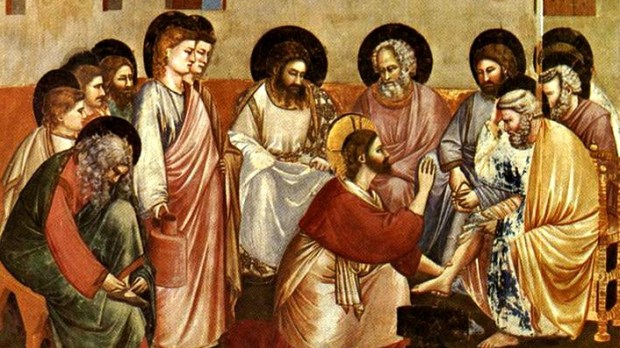Archbishop Arthur Roche of the Congregation for Divine Worship has just published in L’Osservatore Romano a commentary on the decree altering the foot-washing ritual of Holy Thursday—and it includes some significant historical context (h/t Pray Tell):
Illuminated by the gospel of John the rite carries a double significance: an imitation of what Christ did in the Upper Room washing the feet of the Apostles and an expression of the self-gift signified by this gesture of service. It is not by accident this is called the Mandatum from the incipit of the antiphon which accompanied the action: «Mandatum novum do vobis, ut diligatis invicem, sicut dilexi vos, dicit Dominus» (Jhn 13:14). In fact the commandment to fraternal love binds all the disciples of Jesus without any distinction or exception. Already in an old ordo of the 7th century we find the following: «Pontifex suis cubicularibus pedes lavat et unusquisque clericorum in domo sua». Applied differently in the various dioceses and abbeys it is also found in the Roman Pontifical of the 12th century after Vespers on Holy Thursday and in the Pontifical of the Roman Curia of the 13th century («facit mandatum duodecim subdiaconos»). The Mandatum is described as follows in the Missale Romanum of Pope Saint Pius V (1570): «Post denudationem altarium, hora competenti, facto signo cum tabula, conveniunt clerici ad faciendum mandatum. Maior abluit pedes minoribus: tergit et osculatur». It takes place during the singing of antiphons, the last of which is Ubi caritas and is concluded by the Pater noster and a prayer which links the commandment of service with purification from sins: «Adesto Domine, quaesumus, officio servitutis nostrae: et quia tu discipulis tuis pedes lavare dignatus es, ne despicias opera manuum tuarum, quae nobis retinenda mandasti: ut sicut hic nobis, et a nobis exterioria abluuntur inquinamenta; sic a te omnium nostrum interiora laventur peccata. Quod ipse praestare digneris, qui vivis et regnas, Deus, per omnia saecula saeculorum». Enlightened by the gospel which has been heard during the morning Mass, the carrying out of this action is reserved to the clergy («conveniunt clerici») and the absence of an instruction to have “twelve” would seem to indicate that what counts isn’t just imitating what Jesus did in the Upper Room but rather putting the exemplary value of what Jesus did into practice, which is expected of all his disciples.
He continues at some length, noting that it wasn’t always done with 12 men:
The description of the «De Mandato seu lotione pedum» in the Caeremoniale Episcoporum of 1600 … mentions the custom (after Vespers or at lunchtime, in a church, a chapter room or a suitable place) of the Bishop washing, drying and kissing the feet of “thirteen” poor people after having dressed them, fed them and given them a charitable donation. Likewise this could be done to thirteen canons, according to the local custom and wishes of the Bishop, who might choose poor people even where it is the practice that they be canons: «videtur enim eo pacto maiorem humilitatem, et charitatem prae se ferre, quam lavare pedes Canonicis». This meaningful gesture of the washing of feet, although not applied to the entirety of the people of God and reserved to the clergy, did not exclude local customs which take into account the poor or young people (e.g. the Missale Parisiense). The current change foresees that individuals may be chosen from amongst all the members of the people of God. The significance does not now relate so much to the exterior imitation of what Jesus has done, rather as to the meaning of what he has accomplished which has a universal importance, namely the giving of himself «to the end» for the salvation of the human race, his charity which embraces all people and which makes all people brothers and sisters by following his example. In fact, the exemplum that he has given to us so that we might do as he has done goes beyond the physical washing of the feet of others to embrace everything that such a gesture expresses in service of the tangible love of our neighbor.
He also emphasizes something many forget: it is optional. It is up to pastors to determine its use and practice.
Image: Wikipedia

